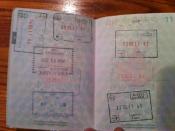One in The Same: WWI + WWII
The World War of the 20th Century was amongst the greatest and most lethal of all modern warfare. It was a horrific time whereas almost every civilized nation in the world was effected one way or the other. Despite the twenty-three year armistice, World War Two was merely Part Two of the First World War with higher stakes due to the fact that the same conflicts were never resolved (by the League of Nations), just drawn deeper into. There were also the same recurring factors such as nationalism, imperialism, and militarism.
Nationalism is defined as an intense loyalty to one's nation. It serves as an important factor to uniting people in one's own nation. Unfortunately, it does not apply to international affairs because they can also invoke powerful rivalries and competition amongst them. And that was exactly what had happened when the success of industrialization in various starting in the middle of the 19th century started to challenge British supremacy in industry, finance, and shipping.
The most radical of those was Germany. And aside from competition with Britain, there is also bitterness on the side of the French when they ceded Alsace-Lorraine to Germany in the Franco-Prussian War of 1870.
Militarism also ties in very closely with Nationalism. Wilhelm 2, the Kaiser of Germany was said to have been the one to lead his country into the First World War. Military might had always been his uttermost important concern for Germany. He was the one who led the campaign of extensive shipbuilding to go against the British Navy. The Kaiser urged nationalism by the way that he thought of Germany and himself the greatest power in Europe:
"There is no power in Europe but me-me and my twenty-five army corps."
All of the Great Powers of Europe (except Britain) had succeeded in building large armies by 1914. They all felt the need to measure their worth and greatness by the power of their armies. They had already begun preparing for war by stressing the importance of quickly rallying and organizing their bases and charting up plans ready-made to achieve that.
Imperialism was also a very vital factor in creating tensions. European countries competed over control of colonies in Africa and Asia in pursuit of resources and dominance. Aside from Germany and France's issues because of the Franco-Prussian War, they had also fought over Morocco during 1905, and again in 1911.
With the tensions so high amongst them, it was only a matter of time that something was going to happen to spark the initiative. And that spark came from the assassination of Austrian Archduke Ferdinand and his wife Sophie while they were visiting Sarajevo, the capital of Bosnia on the June of 1914. Which came as a result of Serb Nationalism. They had considered it an insult that they would have the audacity to promote his tyranny over the day that they had fought back the Turks after years of enslavement. In Borijove' Jevtic's written response about the Archduke's visit, he stated that:
"This was no day for Franz Ferdinand, the new oppressor, to venture to the very doors of Serbia for a display of the force of arms which kept us beneath his heel. Our decision was taken immediately. Death to the tyrant!"
When the Triple Entente (Britain, France and Russia) defeated the Triple Alliance (Italy, Germany, Austria-Hungary), Formed by as result of the Parris Peace Settlement, The League of Nations sought to purge warfare and stabilize international relations. They divided Austria-Hungary, pieces of the Ottoman Empire, and other surrounding areas into 14 new Nations, which is illustrated by the map on page 607 of "Worlds of History". They also imposed the Treaty of Versailles on Germany. Those agreements include:
÷ Their admittance of causing the war.
÷ Demilitarization
÷ Reparations to Allies (33 billion in the 30 years to follow)
÷ Giving back Alsace-Lorraine to France, and overseas colonies in Africa and the Pacific Ocean.
French Nationalism was very much involved in the treaty. Such a figure was Georges Clemenceau, a politician that France had called on to lead them to victory against Germany and fulfill their long-standing vendetta. And he was so adamant and bent on revenge to get Germany to sign the Treaty that he failed to see the possible disastrous consequences that American President Wilson had warned against. The French Legislature even thought that it had been too soft.
Germany was left in shambles, inflation soared over record heights and their economy was in a deep Depression. The exchange rate of their currency (marks) fell from 162 marks to the US dollar to 7,000 in 1922. The American author Ernest Hemingway described how the incomes of the people were not up to par with the falling value of the mark.
Indeed, that treaty would be the major backdrop to the Second World War, for it offered no resolution, just repression that fueled the anger and determination of Germany to get back on it's feet and retaliate.
The League of Nations was weak in the way that they were not able to gain the support of the US because they had not taken to heart the most vital points of Wilson's Fourteen points about going through with the treaty, and they also failed to resolve the issues that were the reason for it's existence. Twenty-three years later, they could not prevent the reinstated Nationalism, Imperialism, and Militarism. This "Second" World War was fought between the Axis Powers of; Germany, Italy, and Japan, and he Allied Powers of; the US, USSR, and Britain.
Germany had been restored beyond its original glory and Nationalist country with the help of the Nazis Party and Hitler. He got them out of their Depression through rebuilding their military. In 1936, he dared to move into Rhineland to reinstate Imperialism, which violated the treaty. When they were met with no real opposition from the League of Nations, they went on to seize Austria German-speaking parts of Czechoslovakia.
In Italy, a fascist party (driven by extreme nationalism) was led by Benito Mussolini sought out to execute their utopian society, which was going to be the "New Rome". After seeing that Germany had no suffered no punishment whatsoever from the League of Nations, he conquered Ethiopia, which belonged to the League.
Another country rising into Nationalism, Imperialism, and was Japan. Through the Meiji Restoration, they had become the undisputed military power of East Asia. They came up with philosophies to justify Imperialism. They lacked natural resources so they were exported, and with their raising population. They annexed Manchuria in 1931, and even though they were reprimanded by the League of Nations, no real action was taken to prevent it time and time again. As illustrated on page 610 of "Worlds of History", most of Western Europe was under some sort of control by the Axis Powers.
This was all characterized by the same kinds of situations that had led to World War One. And despite the split of countries to help preserve national identity of both minority and majority groups alike. In Central Europe, nationality groups were isolated and minority groups were extremely displeased with their treatment. And the situation was just getting worse and history was repeating itself with newer and even deadlier circumstances. An excerpt from the book The Rise of Nationalism by Friedrich Georg Junger even goes to suggest the following:
"The great war has not ended. It has been the prelude to a brutal age of conflict. According to the deepest Insight of the new nationalism, it is a beginning of a terrible, all-demanding struggle."
Indeed, while poison gas, the tank, and the machinegun were used to wipe out large numbers in the First World War. There were now weapons of mass destruction (the atomic bomb) and the sheer force of human brutality displayed in the Holocaust which had gone far in its attempt to wipe clean the entire history and existence of Jews and others deemed an abomination to Hitler's own utopian society.
The League of Nations was supposed to have been the solution, yet they were only able to ineffectively pacify the situation for twenty-three years while bloating it with the apathy of their inactions.
A good document that can be included is a first count experience of the most minor of the 14 nations that came as a result of The Paris Peace Settlement. Their perspective could help us see whether their circumstances have changed, for better or worse as a result of them becoming independent nations. They can provide a new view to see if their suffering was any different from that of the Powers and how they were affected by the encroachment of the Axis powers.
All of the evidence from the documents seems to support that the Two World Wars were part of the same war with the same unresolved conflicts that have merely evolved during the twenty-three year truce. The weapons may have been more destructive, the body count may have been more than a little bit higher, and the upgraded circumstances of Nationalism, Imperialism, and Militarism, had stark contrasts to their predecessor, but it all leads back to the starting tensions that paved way to the downward spiral of World War One.
Sources Used
Documents
÷ Excerpt from The Rise of Nationalism by Georg Junger
÷ The Murder of Archduke Franz Ferdinand by Borijove Jevtic
÷ George Clemenceau: French Tiger
÷ Wilhelm Two: Erratic Kaiser
÷ German Inflation by Ernest Hemingway
Textbook
1) Spodek, Howard. The World's History. New Jersey: Prentice Hall, 2001. 602-613.
2) Beck, Roger B., Linda Black, Phillip C. Naylor, and Dahia I. Shabaka. World History:Patterns of Interactions. McDougal Littell. 743-744.


